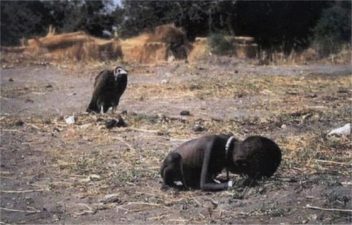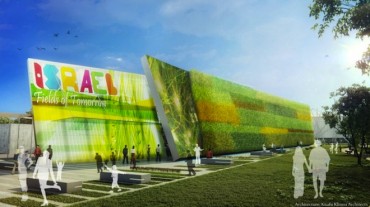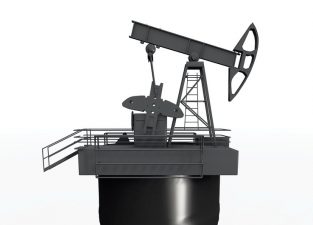 Libyan pivot irrigation at Al KHufrah Oasis: These are not crop circles or part of an Alien movie plot!
Libyan pivot irrigation at Al KHufrah Oasis: These are not crop circles or part of an Alien movie plot!
Libya, in North Africa, now drilling for oil with BP is a country that is not exactly known for having ample quantities of fresh water let alone enough water to be used to any extent in agriculture. Yet this North African desert country, ruled by a man who most people consider to be a bit “eccentric” (if not entirely off the wall) has been involved for years in growing crops by a method known as pivot irrigation.

Center pivot irrigation piping: the water comes from here.
For those who are not aware of how this energy-intensive system works, it is designed to minimize water loss through evaporation, by utilizing a combination of sprinkler and drip irrigation methods that feeds water from a pivot point within a circle.
The water being fed to the crops is measured and dispersed from a series of circular pipes that are rotated on wheeled platforms the gradually moved out from the center of the circle; the place where the water originated from. By using this circular rotation method, less water is wasted and the crops inside the circular agricultural plot are able to receive the maximum amount of water available.
Although used in a number a number of countries, including India and desert regions of the USA, the use of this method to grow crops is so unique in Libya, that the circular pivot irrigation fields are often photographed by both orbiting satellites and NASA space shuttles passing overhead.
In a country like Libya, where more than 95% of the country consists of the near-waterless Sahara, this type of agriculture is not cheap, and is only possible by being able to tap underground fossil water deposits from a large underground aquifer like they’ve done in the Great Man Made River project. Each circular plot is about 1 km in diameter, and is able to grow a number of different crops include grains, fruits and vegetables, and crops for animal fodder.
Pivot irrigation in Jordan.
 Image via Manufactured Landscapes blog. A cool site that looks at man-made structures on earth using Google maps.
Image via Manufactured Landscapes blog. A cool site that looks at man-made structures on earth using Google maps.
Libya is not the only Middle Eastern country trying to “green the desert” through the use of irrigation. Jordan is also practicing pivot irrigation (see above image); Israel has been irrigating for years via its patented “drip irrigation” methods through companies like Plastro and Netafim are now being used in arid regions all over the world, even in arch enemy countries like Syria, and other regional countries, including Qatar in the Persian Gulf region which is teaming up with Syria on agriculture projects intended to “green the desert.”
But none of these countries, except for Libya, have these circular pivot irrigated fields which can actually be seen from above by orbiting astronauts. No one really knows how much Libyan President Muammar al-Gaddafi has spent on these projects, which are probably costing a lot more than simply importing the crops his country needs. But when one is sitting on what is still one of the world’s largest oil reserves (at least 10% of the world’s oil) then anything is possible – as long as the oil holds out.
Photo credit : NASA, US Government, Wikipedia
Read more about efforts to green the deserts:
Doha Bank and UNESCO Join Together to Green the Middle East
DESERTEC Offers Opportunities to Green the Middle East
Drip Irrigation Methods Now Helping Syrian Farmers Grow Crops




I think that what you posted was very reasonable. But, what about this?
what if you typed a catchier post title? I ain’t suggesting your content is not solid., however suppose you added
a headline that grabbed people’s attention? I mean Libya’s Pivot Irrigation in the Sahara Proves Money Can Do Anything |
Green Prophet is a little boring. You could peek at Yahoo’s home page and see
how they write news headlines to grab people interested.
You might try adding a video or a picture or two to get readers excited about what you’ve written. In my
opinion, it might make your blog a little livelier.
Qaddafi opted for the Man Made River Project and not De- desalination Plants considerably cheaper because the latter is based on US/Western Technology and he has been wary of their technological support as experienced in the oil sector.
Yes it has been an expensive project but at least he has not wasted oil money on grand Palaces & other grandiose projects unlike several Arab countries.
As for pivot irrigation cost, again the idea is to make Libya self sufficient in food. Isn’t Saudi Arabia trying to do the same by growing wheat in the Kingdom?!
Qaddafi was amongst the few leaders who saw water as a source of next wars and embarked on the GMR project to ensure water supply for his country for decades.
The West’s ” bogey man ” should be given credit where due!